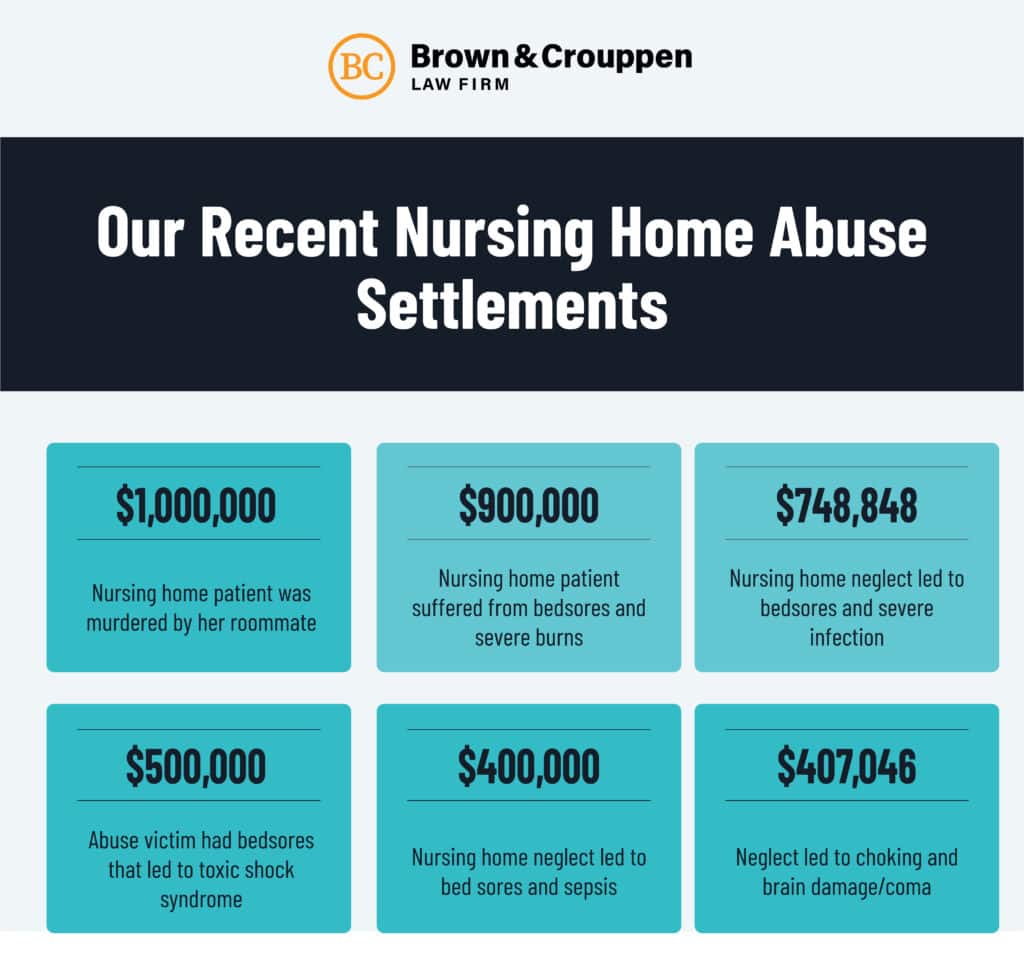Home Elder Abuse Malnutrition Lawsuit
Elder Abuse & Malnutrition Lawsuit
The Midwest's Most Effective Injury Law Firm
This page has been written, edited, and reviewed by a team of legal writers following our comprehensive editorial guidelines. This page was approved by Founding Partner, Terry Crouppen who has more than 40 years of legal experience as a personal injury attorney. Our last modified date shows when this page was last reviewed.
This page has been written, edited, and reviewed by a team of legal writers following our comprehensive editorial guidelines. This page was approved by Founding Partner, Terry Crouppen who has more than 40 years of legal experience as a personal injury attorney. Our last modified date shows when this page was last reviewed.
- Last Modified:
- June 24, 2024
Our knowledgeable and compassionate attorneys at Brown & Crouppen can help you seek justice for your family through an elder abuse malnutrition lawsuit. You can count on us to stand by your side every step of the way as we fight to hold the responsible parties accountable.
If you or a family member have suffered from nursing home malnutrition or dehydration, do not wait to reach out to our experienced legal team. Our nursing home abuse and neglect attorneys serve communities throughout Illinois and Missouri, including St. Louis and Kansas City. Contact us to schedule your free consultation today.
Can You Sue a Nursing Home for Malnutrition and Dehydration?
Yes, in both Missouri and Illinois, you can sue a nursing home for malnutrition and dehydration. According to the World Health Organization, as many as 1 in 6 people over the age of 60 experienced some form of abuse in community settings in 2021. Unfortunately, this includes older people living in nursing homes.
Nursing homes and other care facilities are required by law to provide a minimum standard of care to residents. It’s possible for negligent staff members to abuse residents simply by failing to provide enough nutrition.
The Nursing Home Reform Act (1987) mandates that these types of facilities meet residents’ nutritional needs by providing adequate dietary services. It also established the right of nursing home residents to be treated with dignity and freedom from abuse, mistreatment, and neglect. Failure to comply with this law and uphold the rights of nursing home residents can lead to legal liability.
To learn more about the quality of care in nursing homes, explore these Missouri Nursing Home Ratings.
Residential Care Facility Nutritional Requirements in Missouri
Under Missouri state law, residential care and assisted living facilities are required to provide:
- Balanced and nutritious meals at least three times a day.
- Fresh food prepared in sanitary and safe conditions.
- Meals in accordance with physicians’ orders.
- Consideration of food habits, preferences, physical abilities, and medical needs.
- Fresh water at all times.
- Menus planned in advance while maintaining at least three days of food supplies in the facility.
Mandatory Nutritional Services at Illinois Assisted Living Facilities
Illinois passed the Adult Protective Services Act to prevent the abuse, neglect, and abandonment of older adults. Among other things, Illinois state law also requires assisted living facilities and shared housing establishments to provide residents with:
- Three meals per day.
- Food prepared at the facility or by an outside contractor.
- Sanitary water supply and food handling.
If nursing homes fail in their duty to provide nutritional needs for residents and they suffer illness and injury as a result, there are likely grounds to sue. Working with a trusted elderly abuse malnutrition law firm can put you in the best position to recover compensation for your loved one’s injuries and suffering.
Proving Liability Against a Nursing Home
Proving that a nursing home or assisted living facility is liable for damages can be complex. It normally requires proving the elements of negligence:
- Duty – First, you must show the nursing home had a legal duty of care. For example, nursing homes have a duty to provide a minimum standard of care to residents.
- Breach of duty – Next, you need to establish that the nursing home failed to uphold its duty. For example, if nursing home staff did not meet your loved one’s nutritional needs, they breached their legal duty of care.
- Causation – You must then prove that the breach of duty caused a serious injury or illness.
- Damages – Lastly, your loved one must have suffered compensable damages as a result of their injury or illness (e.g., medical expenses, pain, and suffering).
As a defense, nursing homes and their insurance companies may use unscrupulous tactics to blame residents for their own malnutrition and declining health. They may also say a terminal disease or other underlying condition prevented your loved one from consuming enough food or water.
These underhanded strategies should not stand up to legal scrutiny. Nursing home staff should follow proper protocols when residents are struggling to stay adequately nourished and hydrated. If a nursing home does nothing, it could be liable for damages.
Our experienced nursing home abuse attorneys can conduct a thorough investigation to determine what happened. We are a full-service personal injury law firm with the skills and resources needed to gather all available evidence that the nursing home in your case negligently failed to care for your loved one.
Signs and Symptoms of Malnutrition and Dehydration
Your loved one may not always say when they are being mistreated or neglected. That’s why it is important to vigilantly monitor them for signs of abuse, which may include these symptoms of dehydration and malnutrition:
- Weight loss – A lack of food and adequate nutrition can lead to sudden weight loss.
- Decline in oral health – Malnutrition may cause oral health issues, including gum disease, discoloration, and dry mouth.
- Muscle deterioration – Poor nutrition can cause a loss of lean muscle mass and strength, resulting in noticeable weakness or declined mobility.
- Eye symptoms – Not getting enough food and nutrients can change eye coloration, affect eyesight, and increase the risk of macular degeneration.
- Cognitive issues – A poor diet, dehydration, and malnutrition can also lead to a cognitive decline and an inability to focus or concentrate.
- Behavioral changes – A person who is malnourished may become irritable, tired, depressed, or aggressive.
- Changes to skin – Dehydration and malnutrition can have a significant impact on a person’s skin, changing its color and texture. The skin may also appear more dry, wrinkled, or thin.
- Changes to nails and hair – Malnourishment can lead to thinning hair and soft, brittle nails.
Malnutrition and dehydration can cause serious health conditions that often lead to tragic long-term consequences. If there is no intervention, lack of proper nutrition and water can cause:
- Inability to heal wounds
- Compromised immune systems
- Heart failure
- Wrongful death

Types of Elder Malnutrition Lawsuits
If your loved one has suffered from elder malnutrition or dehydration in a nursing home, you can take legal action against the responsible parties. Depending on how the abuse happened and the outcome of the neglect, the following case types may allow you to seek compensation:
Nursing Home Abuse Lawsuit
Medical Malpractice Claim
Elder malnutrition may also lead to liability based on medical malpractice. For example, if the nursing home legally doubles as a medical facility or works closely with medical providers, you may be able to argue that a breach of the medical standard of care led to your loved one’s injuries and suffering. However, you need a knowledgeable medical malpractice attorney to help you navigate the complex laws governing these cases.
Wrongful Death Claim
If elder malnutrition or dehydration led to your loved one’s death, we extend our most sincere condolences to you and your family. While nothing can undo this kind of loss, your family deserves answers. A wrongful death lawsuit can provide a measure of justice and accountability.
Our legal team goes the extra mile for our clients, and we can do the same for you. Our personal injury attorneys work on a contingency fee basis. This means that we charge no upfront costs or legal fees — we only receive payment if we win your case. Contact us today to learn more about how we can help with your multi-vehicle accident in Kansas City.
Contact Our Experienced Nursing Home Abuse Attorneys for a Free Consultation
With 40+ years of experience and over $1 billion recovered in settlement and verdicts for our clients, our award-winning law firm has what it takes to handle your elder abuse malnutrition lawsuit. Call (800) 536-4357 or reach out online to schedule your free, confidential consultation. You pay nothing unless we win your case.
FREE CASE EVALUATION
Our Results
TESTIMONIALS

- Last Modified:
- June 24, 2024
SCHEDULE A FREE CONSULTATION
